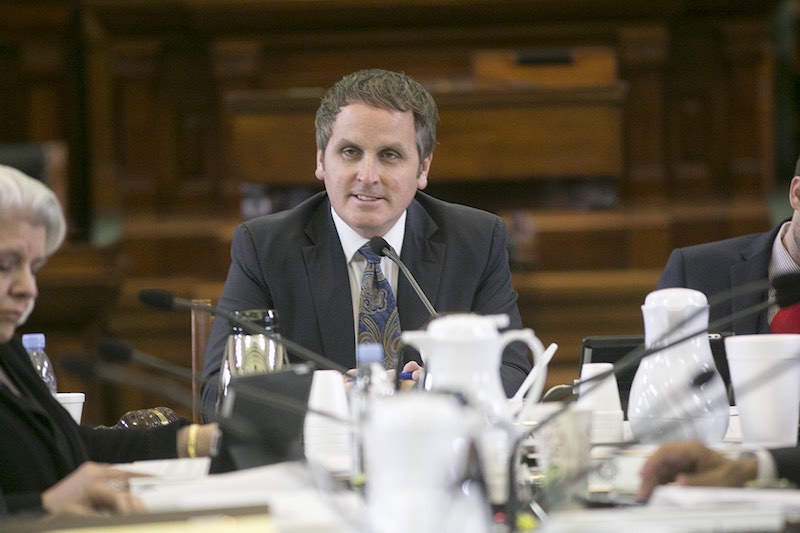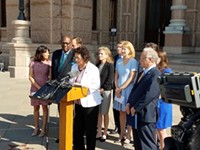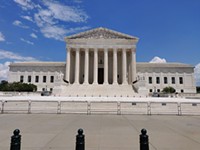House Committee Hears "Discriminatory" Voter Suppression Bill
SB 9 would punish voter form errors with state jail felonies
By Mary Tuma, 9:30AM, Thu. May 16, 2019

Rather than strengthening and expanding voting rights in a state with dismal turnout, Texas Republicans are busy pushing legislation that could suppress the vote.
In a hearing that stretched after midnight, the House Elections Committee on Wednesday, May 15 heard Senate Bill 9 by Sen. Bryan Hughes, R-Mineola. Described by voting rights groups as one of the harshest voter suppression bills in the country and one that carries discriminatory intent, SB 9 is an ostensible attempt at penalizing voter fraud, a virtually non-existent problem drummed up by GOP officials. Just a few months ago, Texas Secretary of State David Whitley, crying possible voter fraud, sounded the alarm on thousands of supposed potential non-citizen voters – it turned out to be an error-ridden list of largely naturalized citizens and the state, facing three lawsuits, was forced to put its tail between its legs and settle out of court.
In reality, SB 9 wouldn’t improve “election integrity” but could punish innocuous mistakes on voter registration forms with state jail felonies (upping it from a Class B misdemeanor) and a fine of up to $10,000. It also adds tougher rules for assisting elderly or disabled voters at the polls, like requiring people who drive three or more people to the polls at the same time for curbside voting to sign paperwork swearing voters are physically unable to enter the voting area without help. SB 9 additionally allows criminally indicted Attorney General Ken Paxton direct access to state voter rolls.
Judges from the five largest counties in Texas, including Travis County’s Sarah Eckhardt, signed on to a letter this week opposing SB 9, writing it would “impose substantial burdens on county election systems” without any new state funding. Specifically, they point out a new voting center methodology (not based in logic) required in the bill would force them to move polling places in communities of color to White-majority areas. Representing 40% of the state population, the judges from Travis, Bexar, Harris, Dallas, and El Paso called SB 9 “an example of poorly conceived policy that would do more damage to elections than improve them.”
Testifying before the committee, Adrian Shelley of non-profit advocacy group Public Citizen, said the group reviewed state election procedures and looked for evidence of voter fraud across Texas, finding “no widespread” fraud. What we do have are examples of people who have been made “sacrificial lambs” for what are probably innocent mistakes, said Shelley, pointing to Crystal Mason, a black woman on supervised release who was sentenced to five years in prison for unknowingly casting an illegal ballot (it was provisional and was never counted), and Rosa Ortega, a Latina who assumed she could vote as a Green Card holder, sentenced to eight years. “We do not need measures that make voting more difficult or more scary,” said Shelley.
Dallas criminal defense attorney Jasmine Crockett said Mason was part of demographic that has been disenfranchised for decades. Her supervision officer, the court, and the election worker helping her fill her ballot did not notify her it was illegal to vote. “She was the poster child that showed if you mess up you can end up in prison,” said Crockett. “A lot of people, especially those who have been to prison before, are not going to take the risk, they’re just not going to vote.” Echoing the point, Rep. Rafael Anchia, D-Dallas, said Mason “had to leave her children behind for state prison – it’s really a chilling effect for other voters and a real deterrent. We are talking about penalty enhancements for people voting with mistaken beliefs.”
Former Texas Democratic representative Lon Burnam, testifying on behalf of voting participation group the May 4th Coalition, called SB 9 “fundamentally flawed.” While the author alleges there’s no intent of voter suppression, the Legislature's history shows otherwise, he said: Over the past nine sessions, there have been 10 federal court findings of racial discrimination in voting laws and intent of voter suppression. “It looks like the Legislature doesn’t really want people to vote,” said Burnam. “I’m asking the committee not to continue this trend.”
Other testifiers pointed out how easy it could be to land behind bars for innocent errors: Discrepancies in names between official government documents versus voter registration forms are common in certain populations, including among transgender residents and Latinx voters. For instance, some take on their mother’s maiden name as a middle name or a last name, which may not match what’s on their ID, leading to an honest mistake.
While hundreds traveled across Texas to testify at the scheduled 8am committee hearing they were left frustrated after Chair Rep. Stephanie Klick, R-Ft. Worth, shut down testimony registration by 8:30am. (The committee took testimony for about 30 minutes before recessing for 10 hours, and resuming again at 8:30pm.) After being turned away in the morning, a group gathered outside the House around 3pm and began delivering testimony on Facebook Live.
Dyana Limon-Mercado, Travis County Democratic Party Chair, was one of those initially shut out testifiers. The working mother says she arrived at the Capitol at 8:40am, after dropping off her kids at school and wading through traffic, at which point the testimony registration had been closed to the public. “This is unacceptable, we cannot be making laws that impact that many Texans and refuse to allow Texans to be involved in the process,” she said.
On Wednesday morning, voting rights groups including the Texas Civil Rights Project, MOVE Texas Action Fund, and the Texas Freedom Network, and activists stood outside the Capitol to denounce SB 9 and deliver more than 7,500 petitions signatures against the bill. Advocates insisted legislators should be focusing on assisting more people to the polls with enacting online voter registration, not attempting to tackle the overblown voter fraud problem. “Let me be clear, there is no voter fraud in Texas,” said Montserrat Garibay of the Texas AFL-CIO. “What we have in the 21st century in Texas is voter suppression.” The true intent of SB 9 is about the GOP maintaining influence over the state, said Sam Robles of Progress Texas – an influence that has been waning in recent years.
“SB 9 seeks to slow down the real, powerful grassroots movement that is happening in this state. Last year we saw dynamics change in Texas. We have more voters that are younger and people of color. Those who have banked on restricting voting rights for marginalized people are nervous,” said Robles. “SB 9 is simply designed to keep those in power in power.”
Got something to say on the subject? Send a letter to the editor.
A note to readers: Bold and uncensored, The Austin Chronicle has been Austin’s independent news source for over 40 years, expressing the community’s political and environmental concerns and supporting its active cultural scene. Now more than ever, we need your support to continue supplying Austin with independent, free press. If real news is important to you, please consider making a donation of $5, $10 or whatever you can afford, to help keep our journalism on stands.
Mary Tuma, June 24, 2019
Nov. 5, 2021
Nov. 1, 2021
Senate Bill 9, 86th Texas Legislature










